雅思基础听力精讲班第9讲讲义
【小站教育】雅思考试听力讲义
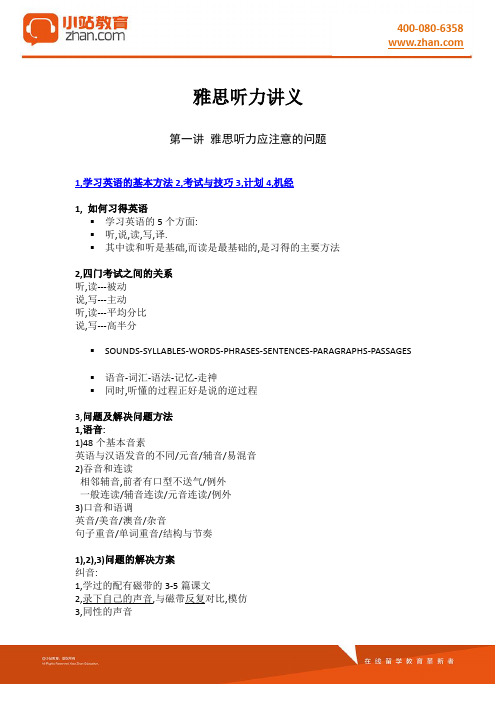
雅思听力讲义第一讲雅思听力应注意的问题1,学习英语的基本方法2,考试与技巧3,计划4,机经1, 如何习得英语▪学习英语的5个方面:▪听,说,读,写,译.▪其中读和听是基础,而读是最基础的,是习得的主要方法2,四门考试之间的关系听,读---被动说,写---主动听,读---平均分比说,写---高半分▪SOUNDS-SYLLABLES-WORDS-PHRASES-SENTENCES-PARAGRAPHS-PASSAGES ▪语音-词汇-语法-记忆-走神▪同时,听懂的过程正好是说的逆过程3,问题及解决问题方法1,语音:1)48个基本音素英语与汉语发音的不同/元音/辅音/易混音2)吞音和连读相邻辅音,前者有口型不送气/例外一般连读/辅音连读/元音连读/例外3)口音和语调英音/美音/澳音/杂音句子重音/单词重音/结构与节奏1),2),3)问题的解决方案纠音:1,学过的配有磁带的3-5篇课文2,录下自己的声音,与磁带反复对比,模仿3,同性的声音4)读音规则一个字母组合发不同的音不同的字母组合发同一个音读音规则问题的解决方案1, 找到读音规则2, 多举不同的例子2,词汇:1)内涵和外延不要只记一个意思,否则在其它地方遇到就不认识了2)用法要记住单词的语境,否则即便记住了也不会用3)同义词听说读写都需要同义词听力中有20-40%的题目需要听同义词4)派生词熟悉单词:词根/词缀3,语法:1)句子结构只有抓住句子结构才能抓住完整的含义.2)代词还原这需要我们更强的短时记忆3)动词形式的含义熟悉动词的含义以及每一种形式的含义词汇和语法问题解决方案快速阅读:1,每天1-2篇学过的课文(10+遍)2,养成抓句子结构的习惯3,180+WPM4,记忆---听写1)单句2)边听边写和听完再写3)两遍一句5,走神:1)边听边走---听着玩每一部分犯的错误都不少2)先走后不走---躺着听S1没有进入状态S2刚刚开始S3,S4比前面两部分好3)先不走后走---边听边译S1不走神S2累了,开始走神S3,S4太累了一直在走神4)自信听力考的是短时记忆听到:写,选听不到:放弃走神问题的解决方案不要:1)听着玩2)躺着听3)时间长或间断4)看着原文听5)听太难的材料(新闻)6)犹豫第二讲考题分析考试介绍I 考试题型1,常考题型1,表格题:个人信息表格/有横纵轴的表格/表格中的完成句子2,完成句子:1)单句填空2)提纲填空3)总结填空3,问答题前三种题型需要我们边听边写的能力4,选择题1)单选2)多选选择题需要我们边听边读的能力2,次常考题型1,地图题:选字母/写地名需要方向感2,搭配题需要边听边读/抽象思维3,不常考题型1,判断改错题:判断/判断改错1)肯,否定词2)专有名词3)数字2,图画题:识图能力3,图例题:工作原理4,推理题:演绎推理4,综合题型1,表格+判断改错2,表格+多选3,表格+搭配II 常考场景1,SURVIVAL1)住宿2)家乡3)度假4)活动2,ACADEMIC:新生入学/图书馆---上述6个话题一般在S1和S2出现,比较简单,因为都是介绍性的话题S3 1)作业2)研究3)选课S4 讲课III 评分标准1,13-16=4.5-517-23=5.5-624-30=6.5-731-35=7.5-82, 写答案注意事项1) 拼写不能出现错误,但是英美拼写均可接受2) 答案要完整3) 不能重复题干中已知信息4) 不要超过字数要求5) 相似答案只能写一个6) 答案可以写标准缩写7) 数字、金钱可以写各种符号IV 计划1, 每天计划1)30分钟/次2)2-4次/天2, 1个月计划使用剑桥系列3,4,5册1)熟悉题型2)列出错误清单3)听写4)预测5)适应考试(考试前2周):心理(8.45听力/9.25阅读/10.30写作)生理(饮食/主场作战)3, 2个月计划▪加上雅思听力特训▪比一般考试难5题左右,能够发现更多问题,考试能够避免更多错误4, 3-6个月计划▪加上LISTEN TO THIS▪半本/月(初级:5-6.5;中级7-8.5)第三讲习题讲解PRACTICETEST 1LISTENINGPRACTICE TEST 1NUMBER OF QUESTIONS: 40APPROX. TIME: 30 MINUTESInstructionsYou will hear a number of conversations and talks and you must answer questions on what you hear.The conversations are recorded and you will have time to read the instructions and questions, and to check your work.The tape will be played ONCE only.The test is organised in 4 sections.You can write your answers on the question paper and at the end of the test you will be given time to transfer your answers to an answer sheet.Section 1 Questions 1 - 10Questions 1 - 3Choose the correct letters A - D.ExampleSergeant Brown is going to speakaboutA comfort.B safety.C the police.D Mr Fogerty.1 Sergeant Brown isA the community patrol officer.B the university security officer.C the community police adviser.D the university liaison officer.2 Sergeant BrownA lives locally and is not married.B lives on the campus and has two daughters.C has a son at the university.D doesn't live on the campus with his daughters.3 Sergeant Brown has been a police officer forA 5 years.B 10 years.C 15 years.D 20 years.Questions 4 - 6Write NO MORE THAN THREE WORDS for each answer.4 The most dangerous place around the campus is ________ .5 The most dangerous place in town is ________ .6 It is dangerous because of ________ .Questions 7 - 8Choose TWO letters A - E.Which TWO items should a student always carry?A a personal alarmB valuablesC a passportD jewelleryE some identificationQuestions 9 - 10Choose TWO letters A - E.Which TWO things does Sergeant Brown recommend a student should do?A walk home in pairsB use public transportC drive homeD not carry a lot of cashE arrange to be home at a certain timeSection 2 Questions 11-20Questions 11 - 13Choose THREE letters A - E.What are John and Sarah discussing?A the amount of work in the second yearB the importance of medieval historyC studying material in a different languageD when their exams will finishE the level of work in the second yearQuestions 14 and 15Write NO MORE THAN THREE WORDS for each answer.14 Why is Sarah working in the market?_____________________________________________________________________ ___15 How many courses must John and Sarah choose?_____________________________________________________________________ ___Questions 16 - 20Write A NUMBER or NO MORE THAN THREE WORDS for each space.Course Credits Tutor Recommendedreading Requirement sMedieval Society 20 Dr Smith Study pack ________(17)Development of Technology 20 Mr Mills Bouchier's'________'(18)NoneThe Crusades I 10 ________ (19) Allison & McKay'sThe First Crusades'FrenchThe Crusades II 10 Dr Shaker &Professor Lord Mallen's 'A GeneralHistory of theCrusades'FrenchPeasants and Kings________ (16)Dr ReevesHobart's'Introduction to the Middle Ages'________ (20)Section 3 Questions 21 - 30Questions 21 - 25Choose the correct letters A - C21 Dr Mullet was particularly impressed by Fayed's A final year dissertation. B personal tutor. C exam results.22 After he took his exams, Fayed felt A nervous. B anxious. C happy.23 Dr Mullet accepts people for the MA course because of A their exam results.B their ability to play games.C a variety of reasons.24 What did Fayed initially go to university to Study? A economics.B booms and crashes.C history.25 The course Fayed is applying for is concerned with A the developing world. B the development of banks. C the economics of work.Questions 26 - 30Complete Dr Mullet's notes on his interview with Fayed in NO MORE THAN THREE WORDS for each space.INTERVIEW WITH FAYEDWorried! Far from his country. ________ (26) ? Will go to study in ________ (27) if not accepted here.After university wants to work ________ (28). Now going to visit ________ (29). My decision - when? ________ (30)选择题的解题思路1、扫描题干,划出核心词2、听时综合扫描选项3、用核心词定位,听到什么选什么4、抄完答案之后检查①同义相斥②相反的有一个是对的③常识选择题的解题技巧1、听到词就选2、结合核心词3、生词原则Section 4 Questions 31 - 40Questions 31 - 35Complete each sentence with NO MORE THAN THREE WORDS.31 The public has more knowledge of vitamins than other parts ________ .32 The public doesn't always eat ________ .33 There is a widespread belief that Vitamin C can ________ .34 Vitamin A helps you see ________ .35 Many people wrongly think that taking vitamin supplements can ________ .完成句子题的注意事项:1、扫描题干,划出核心词,注意空格前后2、判断所需句子成分及词性3、注意核心词同义词替换,句子结构变化的情况用核心词定位占50%,用同义词替换的占30%,句子结构定位为0%-5%4、注意简写答案,再补全在听写的时候练习5、检查答案的词性总结起来就是:读、猜、听、写、查本套题答案:Listening Test 1You will hear a number of different recordings and you have to answer questions on what you hear. There will be time for you to read the instructions and you will have a chance to check your answers. The test is in four sections. Record all your answers in your test book and at the end of the test you will be given 10 minutes to transfer your answers to a special answer sheet.Now turn to Section 1.____________Section 1——————You will hear a policeman giving a talk to some students. First you will have some time to look at questions 1 to 6 (pause for 30 seconds).You will see that there has been an example written for you. On this occasion only the conversation relating to the example will be played first (listen to example).Sergeant Brown is going to speak about safety, so answer B has been circled on the question page.Now we will begin. You should answer the questions as you listen, as you will not hear the recording a second time. Listen to the talk carefully and answer questions 1 to 6. [Mr Fogarty:] ... and so I'd like to hand you over now to Sergeant Brown. Thank you. [Sergeant Brown:]Thank you, Mr Fogarty. Er, yes, as you know my name is Sergeant Jeff Brown, and as Mr Fogarty has indicated, I'll be speaking to you briefly today about security (example), about how to make your time at this university safer and more comfortable.I am officially the university liaison officer (Q1), which means I have a specific brief to act as a go-between for the university and the police, if there are problems, and also to offer an official presence on or around campus and give individuals advice if they need it.Now, my job is very important to me. I take security and reducing the threat of crime on this campus very seriously because, although I don't actually live on the campus, both my daughters attended this university, and my son is still here (Q2). So I am a local policeman in every respect. I have been the university liaison officer for the last five years but I have been in the police force for 15 in all (Q3).Now, on to some advice. The first thing I want to stress is that this university is a comparatively safe place to live. We have had no serious crimes here in the five years I've been here. In fact, crime of any sort is very rare on the campus. We have good security here and although there are a lot of staff and students, the security staff, including myself, are making an effort to get to know your faces!However, as students it is of course wise for you to take precautions to protect yourselves against crime when you are off the campus. As I said, the campus itself is really very safe, but there is a large park right behind it, MacGowan Fields (Q4), and although this is a beautiful place to sit or walk during the day, at night you must be careful. One or two students have reported unpleasant incidents at night while walking in the park, although it must be said that no major incidents have been reported.Now, there are no areas in town which I advise students to avoid as a general rule, but the town centre (Q5) is more hazardous than other areas, especially in the evenings on Friday and Saturday. On these days there is often fighting after people have had too much to drink in the pubs and clubs in the area. There have also been anumber of robberies and muggings (Q6).Before the talk continues you have some time to read questions 7 to 10 (pause for 20 seconds). Now listen carefully and answer questions 7 to 10.Well, that was my advice to you. Most of it is common sense but remember crime always happens when you least expect it. But there are ways to protect yourself. First of all, the university provides all students with personal alarms (Q7). If you are attacked, you can use this to put off your attacker. Secondly, don't take anything with you that cannot easily be replaced like a passport or things of sentimental value. Leave jewellery and other valuables in your room when you go out. Always make sure you take something which will identify you (Q8), perhaps your student card or your driving licence. Thirdly, when you are out late at night, come home in twos (Q9). It's much safer if you're with a friend than on your own. And obviously, don't have very much money on you (Q10). Finally, if you do know you'll be late back and can't use public transport, tell someone else when you expect to be home and if there's a problem, they can raise the alarm. So, that's about all from me and I wish you a pleasant and safe stay here. Thank you.That is the end of Section 1. You will have half a minute to check your answers (pause for 30 seconds).Now turn to Section 2.____________Section 2——————You will hear two students, Sarah and John discussing their choices of courses to study. First you have some time to look at questions 11 to 15 (pause for 30 seconds).Now listen carefully to the discussion and answer questions 11 to 15.Sarah: Hi, JohnJohn: Hello, Sarah. What are you doing in here? Haven't all you exams finished? Sarah: Well, yes, they have, but I've got to make my decisions for next year. I still haven't chosen what courses I'm going to do.John: That's why I'm here. Why don't we have a look through the brochure together? Sarah: That's a good idea. I'm not sure about some of these courses on medieval history.John: No. In fact, I'm not sure about the whole second year. I was talking to Peter Lily the other day - you know, he's just finished the second year - and he was saying that the work load is higher in (Q11) the second year because you have to read all these medieval documents in Latin (Q12). I mean, the first year's been pretty hard but next year will be worse. There are more assignments in the second year - it goes up to six a year for each course, doesn't it?Sarah: Yes But we've got the experience of the first year to build on, so it must get easier. And there isn't so much secondary material in the second year. There aren't so many books about the medieval period.John: Don't you believe it! I think this year's going to be hard work (Q13)!Sarah: Well, perhaps I'd better give up my job then.John: You're working as well?Sarah: Yeah, I've been working in the same place for over a year now. Only part-time, you know. Just Saturday mornings in the market. I mean, it doesn't pay much, but it's interesting and it gives me a bit of extra cash for my text books (Q14). Anyway, what about these courses? How many do we have to take? I remember Professor bolt saying something about four courses in the second year, is that right? Or do we have to do a certain number of credits?John: Both. We have to select four courses (Q15), but for some courses there are two parts. They count as one course. It's six in total, because everyone has to do Europe 1100-1500 and Chronicles of the Church. Anyway, when you've chosen your four courses, they should add up to 80 credits. Have you got the course brochure there? Sarah: Yes. Look ... under ... second year history ... There it is.You now have some time to read questions 16 to 20 (pause for 20 seconds).Now listen to the rest of the discussion and answer questions 16 to 20.John: Right. Yes, look. Most of these courses are 20 credits each, except for the two short courses about the Crusades (Q16). They're 10 each. Now, Medieval Society ... Hmm. What do you think?Sarah: Well, actually, I think it looks really good. Dr Smith is OK, and you don't have to buy any books except a study pack. The best thing is, there are no special requirements (Q17) - no Latin or medieval English!John: The next one is Development of Technology with Mr Mills. Ah ... this is a good one. Peter recommended it. It's all about the way printing developed, and early science. In fact, I think I could get a copy of Bouchier's 'History of Science' (Q18) from him. That means I wouldn't have to buy it.Sarah: That does look interesting. And that doesn't have any special requirements either. What's next ...? Ah, here they are. 10 credits each, the Crusades. You need French to do them. I suppose a lot of the documents are in French.John: That's strange - look. There are different teachers for each part. I expect that's why it's two modules. Dr Clare does the first part (Q19), but it's Dr Shaker and Professor Lord for the second one.Sarah: So that only leaves Peasants and Kings, with Dr Reeves. ... Oh, look, you have to know French (Q20) for this one.John: Well, I must say I don't fancy any course that asks you to have Latin, but I think my French is good enough to read original sources.Sarah: Yes, mine too. Well, what shall we choose?That is the end of Section 2. You will have half a minute to check your answers (pause for 30 seconds).Now turn to Section 3.____________Section 3——————You will hear an interview between Dr Mullet, a university lecturer and a student, Fayed. First you have some time to look at questions 21 to 25 (pause for 30 seconds). Now listen carefully to the interview and answer questions 21 to 25.Dr Mullet: So, Fayed, you found my office quite easily.Fayed: Yes, thank you.Dr Mullet: Thank you for coming such a long way for the interview. I believe you are from the Middle East. Now, Fayed, I really wanted to speak to you during this interview about two things - your exam results and your final-year dissertation. Your thesis, your dissertation, that was something quite special. Your personal tutor actually sent me a copy, and I must say that for a third year undergraduate it's a very polished piece of work.Fayed: Thank you.Dr Mullet: Yes, it's very promising (Q21). Now, the thing is, you tutor tells me that you weren't all that happy with your exams ...Fayed: Well ... The results aren't out yet, as you know. The first four were fine, but in the last three I lost my nerve a bit and didn't do so well. I know I didn't do as well as I could. I was worried (Q22) when I'd handed in my exams.Dr Mullet: Right. Well, exams are a bit of a game anyway. We can't all do well on the day. But here exam results are not everything, as you know - I set great store by other factors in deciding whether we offer you a place on the Master's course (Q23). Perhaps you could tell me a little about how you became interested in economics. Fayed: Yes, of course. Well, I've always been interested in social and economic history, so from a very young age I read about the booms and crashes of the 19th and 20th centuries. I originally applied to study history at university (Q24), but when I got there I realised I had the chance to study economics at a high level, so I changed. My mother used to be an economist at the World Bank, so I had her to help me and guide me. Although she didn't help me write my final-year paper!Dr Mullet: No, quite. Now, you're applying for the Master's course in the Economics of the Developing World (Q25), taught by myself and Dr Branigan. Why this particular course?Fayed: Well, I've read some of your work on-the development of rural banks and I thought this was a good place to be. I mean, this is my first choice.Now you have some time to read questions 26 to 30 (pause for 20 seconds).Now listen to the rest of the interview and answer questions 26 to 30.Dr Mullet: And you're not worried about feeling homesick? You are still young, and Australia is a very long way from your home (Q26). I mean, your English is fine, there are no problems with language or attitude, but the distance from your family may make it hard for you at first.Fayed: I've thought about that. But it's a problem wherever I go. If I don't get in here, I'll probably take a place at a university in England (Q27). That's just as far from home!Dr Mullet: I see, I see. And what are your long-term ambitions, Fayed? What do you want to do ultimately with your Qualifications and your life?Fayed: I want to work in my country (Q28). You know there are some problems there, and I want to try to right some of them in the economic infrastructure.Dr Mullet: I see. And this is your last interview, I believe. That gives you four weeks before the next term starts. What will you do during your holidays?Fayed: Oh, I'm going to relax. I was going to work on my English, but in fact I've got a couple of friends in Hamburg, so I think I'll go and stay with them (Q29) instead asI've never been to Germany.Dr Mullet: I see. Well, Fayed, as you know I can't give you a decision right away. However, I can tell you that you've made quite an impression with your application, and I think you should not worry too much about the place. My decision will be made tomorrow (Q30) after I've seen the last candidate, and I'll let you know within the next two weeks.Fayed: Thank you very much.Dr Mullet: Well, thank you for attending the interview.That is the end if Section 3. You now have half a minute to check your answers (pause for 30 seconds).Now turn to Section 4.____________Section 4——————You will hear a lecturer give a talk on nutrition. First you have some time to look at questions 31 to 40 (pause for 40 seconds).Now listen carefully to the talk and answer questions 31 to 40.Now, the topic of today's talk is nutrition - specifically, vitamins and minerals. I'll be dealing first with some of the most common misconceptions about them. Then I'm going to talk about what vitamins there are, where they come from, and the quantities we need. We'll have some time at the end of the talk for any questions you may have.OK Well, vitamins are known to the general public - in fact, the public knows moreabout them than it does about certain other key aspects of nutrition (Q31). One reason for this is that vitamins have been in the public eye for quite a while - at least since the middle of the 20th century, when their importance first became widely recognised. This awareness does mean that the public knows how important vitamins are - even if it doesn't mean that we all eat a healthy diet all the time (Q32). However, a problem does arise that is associated with this, which is the number of old wives' tales about vitamins. Usually these fallacies are not dangerous, but they do lead to an unnecessarily high intake of vitamin supplements. For example, it is widely held that high doses of vitamin C will cure colds and flu (Q33). I'd like to hit this one on the head - there is no evidence that any vitamin can cure anything! No, I'm afraid you'll just have to let time sort out your cold. And of course, the body can't store vitamin C, so those tablets you take are just an expensive waste of time.Another common belief with no evidence is the idea that vitamin A helps you see in the dark (Q34). Actually, there is some truth in this one, because vitamin A is necessary for good vision. But in the dark, in real darkness, nobody can see. And of course, taking too much vitamin A can actually be bad for you. But perhaps the most misleading idea, heavily promoted by certain companies, is that vitamins will make you intelligent (Q35). Now, while a healthy diet is essential if you are to make the most of your intelligence, there is no evidence whatsoever that vitamin supplements can make the slightest bit of difference (pause for 3 seconds).So what can vitamins do? Or, perhaps more accurately, why do we need them? Well, the answer is that we need them for all sorts of reasons.Vitamin A, for example, also called retinol, is essential for good eyesight, especially at night, and to help us fight off (Q36) infection and illness. We get it from liver, butter, egg yolks and milk.Vitamin D, as is well known, is used to build strong teeth (Q37) and bones, but it also helps us absorb calcium. Vitamin D is mainly formed in the skin through the action of sunlight. How much you need depends on different factors such as age and health. Vitamin E, tocopherol, is less well-known, but is necessary in maintaining a healthy balance of fats in the body. We need 10-12 mg (Q38) every day, and although some people take supplements, you can normally get what you need from a balanced diet. The B complex includes vitamins B1, thiamine, B2, riboflavine, B6, pyridoxine andB12, cyanocobalamin. It performs many functions, including allowing our bodies to metabolise carbohydrates, forming healthy tissue, and perhaps most importantly, forming red blood cells (Q39) to prevent pernicious anaemia. We need varying amounts of the B complex, and while most of us can get enough from awell-balanced diet, vegetarians may find themselves deficient in B12, which is only found in any noticeable quantity in meat, especially liver.Finally, vitamin C is the one everyone knows. Ascorbic acid, as it's also known, helps fight infection, which perhaps accounts for the myth about preventing colds. It also helps protect against scurvy. We need 30 mg a day, and can only really get this amount from eating plenty of citrus fruit (Q40) and fresh vegetables. Now, in a moment I'll be moving on to talk about how we can plan a diet which will supply all our vitamin needs. But before that, I'd like to look at some of the recent advances inour knowledge of the ways vitamin deficiencies can affect us ...(fade)That is the end of Section 4. You will have half a minute to check your answers (pause for 30 seconds).That is the end of the Listening Test.You now have 10 minutes to transfer your answers to the Listening answer sheet (pause for 10 minutes).Please stop writing.TEST 2LISTENINGPRACTICE TEST 1NUMBER OF QUESTIONS: 40APPROX. TIME: 30 MINUTESInstructionsYou will hear a number of conversations and talks and you must answer questions on what you hear.The conversations are recorded and you will have time to read the instructions and questions, and to check your work.The tape will be played only ONCE.The test is organised in 4 sections.You can write your answers on the question paper and at the end of the test you will be given time to transfer your answers to an answer sheet.本套题题型分析:Section 1 Questions 1 - 12Questions 1 - 8表格题Questions 9 - 12单选题Section 2 Questions 13 - 20Questions 13 - 16多选题Questions 17 - 20问答题Section 3 Questions 21 - 30Questions 21 - 26 搭配题Questions 27 - 30单选题Section 4 Questions 31 - 40Questions 31 - 40地图题&完成句子题Section 1 Questions 1 – 12个人信息表格题做题关键:1、信息修正:注意否定词、转折词及表示修改的词2、速度陷阱:①答案前后语速慢,答案加快②紧张导致定位失败解决办法:①速度的练习:主要是对吞音、连读等语音的练习和单位时间处理信息量的练习②预测的练习:在听之前预测缺省信息3、计算的问题:单位的换算:fortnight两周,decade十年,dozen十二,score二十要特别注意时间的计算4、地名:其他题中可能提供要写的地名①常见地名:英、澳、加、美常见地名②常用地名:Fountainroad、Spring Court、BrookstreetQuestions 1 - 8For questions 1 - 8 complete the notes below. Write NO MORE THAN THREE WORDS for each answer.Example Customer requirements: a (example) flight to Delhi.English Airwayscost (1)route direct flight departure time Monday, 15.00 arrival time Tuesday, 03.25 other features extra leg room,personal TV...................... (2) Air Broncocost £212route via......................(3)departure time (4)arrival time Tuesday, 16.30 other features 20kg baggage maxDBG Airlinescost (5)route via Istanbul Karachi Air Tourscost £383route via Abu Dhabideparture time Monday, 12.00 arrival time Tuesday, 10.15 other features ....................... (6) 25 kg baggage max departure time Monday, 11.35 arrival time ....................... (7) other features .. (8)Questions 9 - 12Circle the correct letters A - C.9 When does the travel agent advise Sunil to book his ticket? A the following month B after seven days C straightaway10 Which airline provides the quickest route home? A English Airways B Air Bronco C DGB Airlines11 Which airline provides the cheapest route home? A English Airways B Air BroncoC Karachi Air Tours12 What is the reason for Sunil's choice? A the flight is the cheapestB the flight allows him to visit his auntC the flight is best overallSection 2 Questions 13 - 20Questions 13 and 14Circle TWO thing you MUST NOT take on board with you.A cigarettesB lighter fuelC matchesD gifts wrapped by a friendE mobile phonesQuestions 15 and 16Circle TWO things you MUST take on board with you.A passportB booksC boarding passD foreign currencyE sandwiches。
剑桥雅思9听力原文加翻译双语
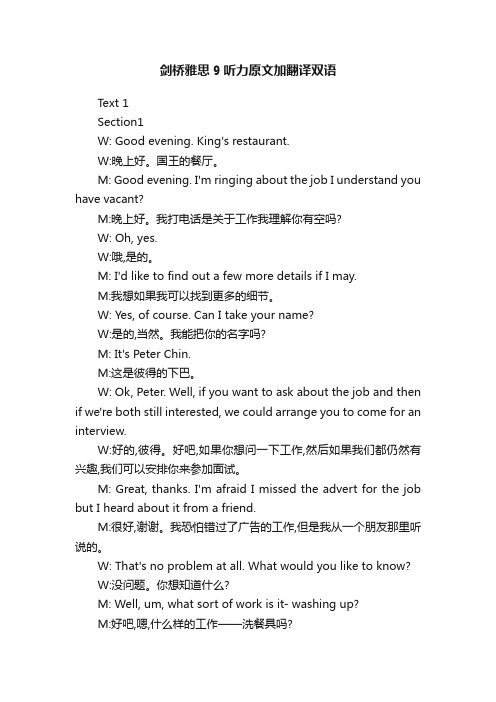
剑桥雅思9听力原文加翻译双语Text 1Section1W: Good evening. King's restaurant.W:晚上好。
国王的餐厅。
M: Good evening. I'm ringing about the job I understand you have vacant?M:晚上好。
我打电话是关于工作我理解你有空吗?W: Oh, yes.W:哦,是的。
M: I'd like to find out a few more details if I may.M:我想如果我可以找到更多的细节。
W: Yes, of course. Can I take your name?W:是的,当然。
我能把你的名字吗?M: It's Peter Chin.M:这是彼得的下巴。
W: Ok, Peter. Well, if you want to ask about the job and then if we're both still interested, we could arrange you to come for an interview.W:好的,彼得。
好吧,如果你想问一下工作,然后如果我们都仍然有兴趣,我们可以安排你来参加面试。
M: Great, thanks. I'm afraid I missed the advert for the job but I heard about it from a friend.M:很好,谢谢。
我恐怕错过了广告的工作,但是我从一个朋友那里听说的。
W: That's no problem at all. What would you like to know?W:没问题。
你想知道什么?M: Well, um, what sort of work is it- washing up?M:好吧,嗯,什么样的工作——洗餐具吗?W: It's answering the phone.W:这是接电话。
雅思学习计划(最新9篇)
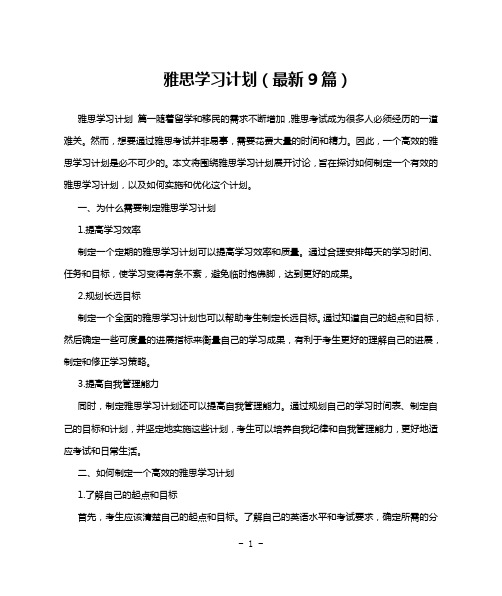
雅思学习计划(最新9篇)雅思学习计划篇一随着留学和移民的需求不断增加,雅思考试成为很多人必须经历的一道难关。
然而,想要通过雅思考试并非易事,需要花费大量的时间和精力。
因此,一个高效的雅思学习计划是必不可少的。
本文将围绕雅思学习计划展开讨论,旨在探讨如何制定一个有效的雅思学习计划,以及如何实施和优化这个计划。
一、为什么需要制定雅思学习计划1.提高学习效率制定一个定期的雅思学习计划可以提高学习效率和质量。
通过合理安排每天的学习时间、任务和目标,使学习变得有条不紊,避免临时抱佛脚,达到更好的成果。
2.规划长远目标制定一个全面的雅思学习计划也可以帮助考生制定长远目标。
通过知道自己的起点和目标,然后确定一些可度量的进展指标来衡量自己的学习成果,有利于考生更好的理解自己的进展,制定和修正学习策略。
3.提高自我管理能力同时,制定雅思学习计划还可以提高自我管理能力。
通过规划自己的学习时间表、制定自己的目标和计划,并坚定地实施这些计划,考生可以培养自我纪律和自我管理能力,更好地适应考试和日常生活。
二、如何制定一个高效的雅思学习计划1.了解自己的起点和目标首先,考生应该清楚自己的起点和目标。
了解自己的英语水平和考试要求,确定所需的分数和所需的时间。
只有了解自己的起点和目标,才能更好地制定学习计划和策略。
2.制定一个详细的学习时间表制定一个详细的学习时间表非常重要,这可以帮助考生里程碑式地实现自己的长期目标。
首先,考生可以制定一个日常的学习时间表,规定每天学习的时间和任务,同时根据自己的实际情况调整学习计划。
其次,考生可以针对不同的考试模块,制定不同的时间表,比如听力、阅读、写作和口语,以及充分考虑本身的强项和弱项,进行针对性的`安排。
3.确定学习目标和任务也很重要,考生应该制定实际可操作的学习目标和任务,以便更好地完成学习。
例如,如果你发现口语能力比较差,你就可以尝试每天跟着雅思口语教程练习口语,每天朗读半小时等等。
雅思听力高分段讲义
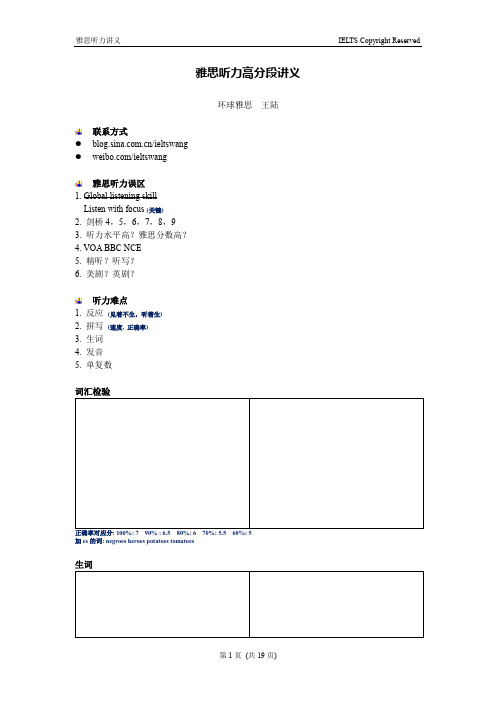
雅思听力讲义
雅思听力高分段讲义
联系方式 /ieltswang /ieltswang
词汇检验
环球雅思 王陆
IELTS Copyright Reserved
正确率对应分: 100%: 7 90% : 6.5 80%: 6 70%: 5.5 60%: 5 加 es 的词: negroes heroes potatoes tomatoes
生词
第 1 页 (共 19 页)
雅思听力讲义
IELTS Copyright Reserved
12. What will the reviewer concentrate on today?
A. theatre
B. dance
13. How many circuses are there in the festival?
A. one
edition slightly celebrations sensational theater report theme performances tradition canvas portable building stadium car park routines magical lighting expensive adult tastes dance & music production venue outstanding tricks features outdoors comedy routines amazing wood & cloth audience stress management registration
剑桥雅思听力9题目

剑桥雅思听力9题目剑桥雅思听力9题目是雅思听力考试中经典的一套题目,需要考生在限定的时间内听录音,并回答相关问题。
这套题目帮助考生熟悉雅思听力的考试形式,提高他们的听力技巧和应对能力。
以下是对剑桥雅思听力9题目的描述和分析。
第一篇文章:第一篇文章是关于一个名叫George Thompson的男子决定放弃城市生活,搬到农村一切重新开始的故事。
听录音时,考生需要听出George的决定和理由,并回答相关问题。
这篇文章适合用故事形式写,首先介绍George的决定,然后说明他的理由。
通过描述他的城市生活压力和他对农村生活的向往,突出他想要追求简单和自由的心态。
最后可以引用他的一句话:“我需要找回内心的平静,远离城市的喧嚣和压力。
”第二篇文章:第二篇文章是一则关于英国学生Kelly邀请她的朋友Tina去参观博物馆的对话。
考生需要通过听录音,理解Kelly邀请Tina的原因,并回答一些相关问题。
这篇文章适合用对话形式来写。
首先介绍Kelly和Tina是好朋友,然后描述Kelly为什么邀请Tina去参观博物馆。
可以通过描述Kelly对博物馆的喜爱和她希望和Tina一起度过美好时光的愿望。
最后可以描述她们一起参观博物馆的情景,展示她们的友谊和共同的兴趣。
第三篇文章:第三篇文章是关于一项研究调查发现男性在婚姻中的角色发生了变化的报道。
听录音时,考生需要记住男性在家庭中新承担的责任,并回答有关这项研究的问题。
这篇文章适合用新闻报道的形式来写。
首先介绍这项研究的背景和目的,然后详细描述男性在家庭中承担新的角色,如更多地参与家务和照顾孩子。
可以通过引用研究报告中的数据和专家的观点来加强文章的可信度。
最后可以总结这项研究的意义和对社会的影响。
第四篇文章:第四篇文章是关于一个女演员Sarah参加一个新电影试镜的故事。
听录音时,考生需要理解Sarah决定参加试镜的原因,并回答一些相关问题。
这篇文章适合用事实记述的形式来写。
首先介绍Sarah是一位演员,并说明她的演艺梦想。
[最新]剑9听力test12解析
![[最新]剑9听力test12解析](https://img.taocdn.com/s3/m/c80a4cc1b04e852458fb770bf78a6529647d35bc.png)
剑桥雅思真题9/Test 1听力解析Section 1:工作咨询(属于日常场景)必备词汇:1. vacant adj. 空缺的2. detail n. 细节3. arrange v. 安排4. interview n. 面试5. permit n. 允许6. branch n. 分支7. recruit v. 招募8. fringe adj. 附加的9. benefit n. 利益试题解析:1. answering the phone当听到what sort of work is it ?这句话时,就要做好答题准备,因为sort是题目中type的同意替换。
回答人用It’s answering the phone.这句,明确地给出了答案。
2. Hillsdunne Road 这道题难度不大。
主要是听拼写和注意首字母大写。
由题目work inthe。
branch可以预测这里肯定是表示地点的名词。
当听到we havetwo branches.这句时,本题答案也就接近了。
3. library 原文中对应的信号词是nearest。
而beside这个词正好是next to的同意替换,所以,紧跟其后的library就是答案。
4. 4.45 题目和原文一致的词是pay,当听到could I ask about the pay?这句话后,下一句便直接给出了答案。
只是大家要熟悉钱的读法fourpounds forty-five。
类似的考点还有很多,写法都一样的。
而后面的3.95要注意时态是was,所以肯定不是这份工作的薪资。
5. national holidays 此题和已经给出的a free dinner是并列的,所以凡是并列的内容,大部分都会有表示并列关系的词来引导。
当原文出现a free dinner后大家只需要去听哪个地方有表示并列关系的词,那句话便是此题的依据,恰好And we also offer extra pay for working on nationalholidays中的and和also都表示并列,而且此题几乎是原句,所以比较简单。
雅思听力9分不可不知的23个细节
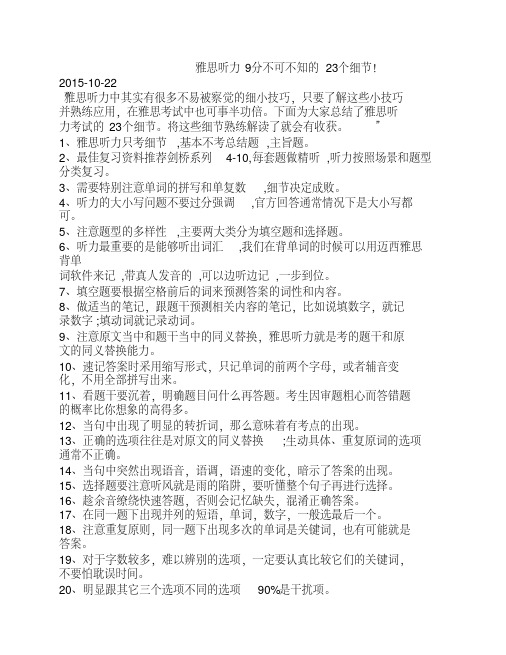
雅思听力9分不可不知的23个细节!2015-10-22“雅思听力中其实有很多不易被察觉的细小技巧,只要了解这些小技巧并熟练应用,在雅思考试中也可事半功倍。
下面为大家总结了雅思听力考试的23个细节。
将这些细节熟练解读了就会有收获。
”1、雅思听力只考细节,基本不考总结题,主旨题。
2、最佳复习资料推荐剑桥系列4-10,每套题做精听,听力按照场景和题型分类复习。
3、需要特别注意单词的拼写和单复数,细节决定成败。
4、听力的大小写问题不要过分强调,官方回答通常情况下是大小写都可。
5、注意题型的多样性,主要两大类分为填空题和选择题。
6、听力最重要的是能够听出词汇,我们在背单词的时候可以用迈西雅思背单词软件来记,带真人发音的,可以边听边记,一步到位。
7、填空题要根据空格前后的词来预测答案的词性和内容。
8、做适当的笔记,跟题干预测相关内容的笔记,比如说填数字,就记录数字;填动词就记录动词。
9、注意原文当中和题干当中的同义替换,雅思听力就是考的题干和原文的同义替换能力。
10、速记答案时采用缩写形式,只记单词的前两个字母,或者辅音变化,不用全部拼写出来。
11、看题干要沉着,明确题目问什么再答题。
考生因审题粗心而答错题的概率比你想象的高得多。
12、当句中出现了明显的转折词,那么意味着有考点的出现。
13、正确的选项往往是对原文的同义替换;生动具体、重复原词的选项通常不正确。
14、当句中突然出现语音,语调,语速的变化,暗示了答案的出现。
15、选择题要注意听风就是雨的陷阱,要听懂整个句子再进行选择。
16、趁余音缭绕快速答题,否则会记忆缺失,混淆正确答案。
17、在同一题下出现并列的短语,单词,数字,一般选最后一个。
18、注意重复原则,同一题下出现多次的单词是关键词,也有可能就是答案。
19、对于字数较多,难以辨别的选项,一定要认真比较它们的关键词,不要怕耽误时间。
20、明显跟其它三个选项不同的选项90%是干扰项。
21、没有证据,切忌想当然。
《剑桥雅思9》听力解析-小黑雅思张老师书稿第一部分(1)
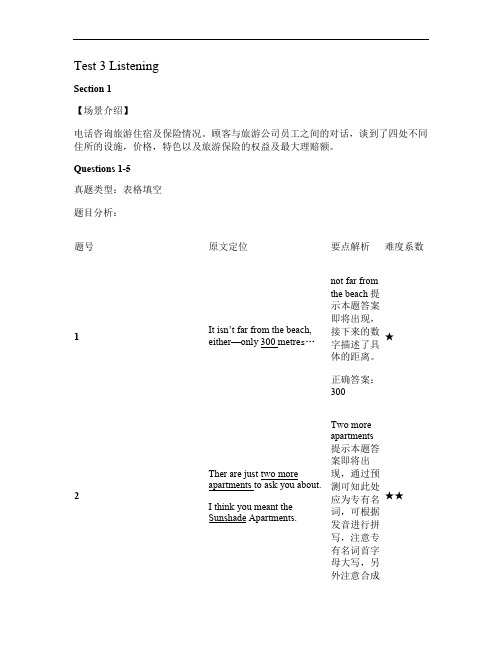
Test 3 ListeningSection 1【场景介绍】电话咨询旅游住宿及保险情况。
顾客与旅游公司员工之间的对话,谈到了四处不同住所的设施,价格,特色以及旅游保险的权益及最大理赔额。
Questions 1-5真题类型:表格填空题目分析:题号原文定位要点解析难度系数1It isn’t far from the beach,either—only 300 metre s…not far fromthe beach提示本题答案即将出现,接下来的数字描述了具体的距离。
正确答案:300★2Ther are just two moreapartments to ask you about.I think you meant theSunshade Apartments.Two moreapartments提示本题答案即将出现,通过预测可知此处应为专有名词,可根据发音进行拼写,注意专有名词首字母大写,另外注意合成★★词的拼写。
正确答案:Sunshade3It’s a older style house withGreek paintings in everyroom, and a balcony outside.根据顺序原则比较容易捕捉到答案所在之处,此题单词辨音与拼写是关键。
正确答案:balcony★4What are the views like?Well, there are forests allround and…此题与上一题相距较近,容易漏听。
正确答案:forest/forests★5And the price?£319 at that time, but…此题较为简单,审题时注意到此处应为数字就很容易得到答案。
注意题中已给出货币符号,这里只填入数字即可,另外注意319和390读音的不同。
正确答案:★319Questions 6-10真题类型:表格填空题目分析:题号原文定位要点解析难度系数6Well, the first thing is cancellation.If the holiday’s cancelled…,youcan claim £8,000.For Greek Island holidays, ourmaximum is £10,000. Cancellation, cancelled 的出现提示本题答案即将出现。
- 1、下载文档前请自行甄别文档内容的完整性,平台不提供额外的编辑、内容补充、找答案等附加服务。
- 2、"仅部分预览"的文档,不可在线预览部分如存在完整性等问题,可反馈申请退款(可完整预览的文档不适用该条件!)。
- 3、如文档侵犯您的权益,请联系客服反馈,我们会尽快为您处理(人工客服工作时间:9:00-18:30)。
雅思基础听力精讲班第9讲讲义
unit4
Unit4 学习
常考词汇听写:
Course
Register in
Register for
Sign up
Enroll in
Lecture
Tutorial
Professor
Dean
Counselor
Attendance
Presentation
T est take … course take … test
听力练习一
Practice 1
You will hear part of a talk to new students at a university. Questions 1-3
Circle the correct letters A-C.
1Who are mentors?
A new students
B second or third-year students
C university teachers
2How often should mentor groups meet?
A once a week
B once a fortnight
C once a month
3What is it essential to do at the first meeting?
A explain your problems
B make new friends
C agree when to meet again
Questions 4-7
List FOUR things which students may be given information about.
Write NO MORE THAN THREE WORDS for each answer.
4
5
6
7
Questions 8-10
Complete the sentences below. Write NO MORE THAN THREE WORDS for each answer. 8Your mentor will show you how to obtain a free
9Mentoring is useful for people who are
for the first time.
10Your mentor may give you advice on how to
听力练习二
Practice 2
Questions 1-5
Listen to the interview on truancy and complete the notes. Write NO MORE THAN THREE WORDS for each answer.
According to David Renshaw, continued absence from school could be harmful to a child’s education and also lead to a 1 .
The government is trying to stop truancy using:
· long term imprisonment
· 2 prison sentences
· 3
Lorna says reasons for truancy include:
· unhappiness at home
· peer pressure
· 4
Lorna thinks the following people should be involved:
parents, children, 5 , the government and social services. Matching
Questions 6-8
If Lorna Coates (the charity representative) states this, write L.
If David Renshaw (the government official) states this, write D.
If Jennifer Simpson (the mother) states this, write J.
If the presenter states this, write P.
6Over 12, 000 children played truant in the Spring
7Prison sentences won’t help children who are unhappy at school
8Counselling works well。
